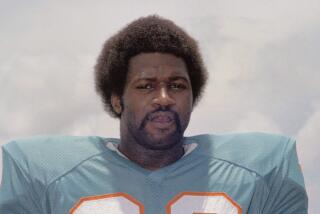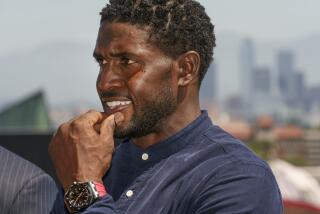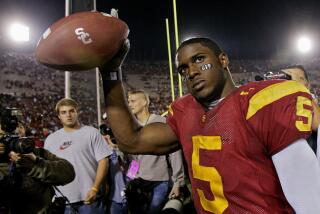A consumer’s guide to the best and worst of sports media and merchandise. Ground rules: If it can be read, played, heard, observed, worn, viewed, dialed or downloaded, it’s in play here.
- Share via
What: “SportsCentury: Jim Plunkett”
Where: ESPN Classic, Friday, 5 p.m.
The idea behind ESPN Classic continuing ESPN’s “SportsCentury” series is that there are many prominent athletes that have good stories, whether they ranked in the cable network’s top 50 or not. Jim Plunkett, Heisman Trophy winner and two-time Super Bowl winner, is exactly that type of athlete.
The many interesting facets of Plunkett’s life and career are explored in this excellent one-hour feature. It’s pretty well known that Plunkett was raised in a poor area of San Jose by a mother who was totally blind and a father who was legally blind. It’s not as well known that a tumor in Plunkett’s neck almost ended his career before it started.
It was removed eight months before he began his freshman season at Stanford. Although the growth was benign, the surgery made him less mobile and his coaches asked him to switch from quarterback to defensive end. He threatened to leave Stanford if he couldn’t play quarterback.
That situation is dealt with early in the profile, as are his struggles with the New England Patriots. The NFL’s No. 1 draft choice in 1971, he went on to become the rookie of the year. Then came the lean years. In 1976, he was traded to the San Francisco 49ers.
The 49ers cut Plunkett two years later, and he says at that point he questioned his ability and wanted to quit. Dick Vermeil, then coach of the Philadelphia Eagles, said he wanted to sign Plunkett as a backup, but “I didn’t want to be the next guy to cut him.”
At this point, the profile goes back to Plunkett’s childhood, and the embarrassment that came with being dirt poor and having blind parents. “Sometimes lunch was a ketchup sandwich,” Plunkett says.
Despite his hardships, he had the grades and SAT score to get into Stanford. His father died at 56 in the spring of 1969, and in 1970 Plunkett won the Heisman and led his team to a 27-17 upset victory over Ohio State in the Rose Bowl.
When his pro career appeared over in 1978, it was Al Davis and Raider Coach Tom Flores who came to the rescue, signing him as their No. 3 quarterback for $465,000 over three years. He played nine seasons for the Raiders, leading them to Super Bowl victories in 1981 and ’84. He was the Super Bowl most valuable player in the Raider victory over the Eagles in ’81.
The week of that game, the profile reminds viewers, Plunkett was asked possibly the dumbest question ever: “Now what is it, blind mother, dead father, or dead mother, blind father?”
More to Read
Go beyond the scoreboard
Get the latest on L.A.'s teams in the daily Sports Report newsletter.
You may occasionally receive promotional content from the Los Angeles Times.










